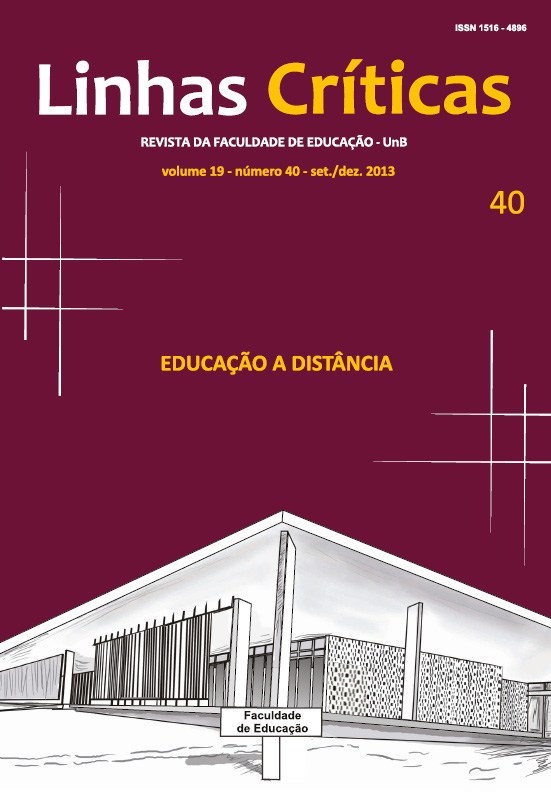Teaching work, distance education and ICT: between excitement and overwork
DOI:
https://doi.org/10.26512/lc.v19i40.4191Keywords:
Teaching work, Distance Education, Virtual Learning, Environment, Mediation and InteractionAbstract
This study discusses signs of transformation in teaching work during the implementation of distance education courses, with an increase in the use of information and communication technologies. After research revealed the existence of few studies related to this subject area, the case-study approach was used to collect data in an undergraduate course which, due to its characteristics, required mediation and interaction processes through a virtual learning environment. This influenced the ways in which professors and academic advisers worked, which was reflected in their educational practice. However, it is necessary to rediscuss the subject, considering findings related to overwork in this type of teaching activity.
Downloads
References
ALONSO, Katia Morosov. Educação a distância e tutoria: anotações sobre o trabalho docente. In: ALONSO, Katia Morosov; RODRIGUES, Rosângela Schwarz; BARBOSA, Joaquim Gonçalves. Educação a distância ”“ práticas, reflexões e cenários plurais. Cuiabá: Central de Texto: EdUFMT, 2010, p. 81-98.
BELLONI, Maria Luíza. Educação a Distância. Campinas: Autores Associados, 1999.
BLIKSTEIN, Paulo; ZUFFO, Marcelo Knörick. As sereias do ensino eletrônico. In: SILVA, Marco. (Org.). Educação online. São Paulo: Loyola, 2003. p. 23-38.
BRASIL. Referencias de Qualidade para Cursos Superiores a Distância. Disponível em:<http://portal.mec.gov.br/seed/arquivos/pdf/legislacao/refead1.pdf>. Acesso em: 21 ago. 2011.
COVEZZI, Marinete; OLIVEIRA, Anderson Castro Soares de; SANTOS, Sandro Aparecido Lima dos. (2011). Imigrantes brasileiros no Japão: expectativas, estratégias e reorientações no mercado de trabalho. XXVIII Congresso Internacional da ALAS - 6 a 11 de setembro/2011, Recife: UFPE. Disponível em: <http://www.sistemasmart.com.br/alas/arquivos/18__8_2011_0_25_37.pdf>. Acesso em: 10 jan. 2012.
SILVA, Danilo Garcia da; ALONSO, Katia Morosov; MACIEL, Cristiano. Os ambientes virtuais de aprendizagem, participação e interação, ou sobre o muito a caminhar. PERSPECTIVA, Florianópolis, UFSC, v. 30, n. 1, 77-104, jan./abr. 2012.
MILL, Daniel; RIBEIRO, Luis Roberto de Camargo; OLIVEIRA, Marcia Rosenfeld Gomes (Org.). Polidocência na educação a distância: múltiplos enfoques. São Carlos: EdUFSCar, 2010.
PEIXOTO, Joana. A concepção de dispositivo pedagógico que integrem as TIC. Inter-Ação, Goiânia, UFG, 34 (1): 89-104, jan./jun. 2009.
PROJETO POLÃTICO PEDAGOGICO DO CURSO DE PEDAGOGIA ACORDO BRASIL/JAPÃO. Mato Grosso: UFMT, 2009. Disponível em:. Acesso em: 24 maio 2012.
SANTAELLA, Lucia. Navegar no ciberespaço: o perfil cognitivo do leitor imersivo. São Paulo: Paullus, 2004.
SANTOS FILHO, José Camilo dos; GAMBOA, Silvio Sánchez. Pesquisa educacional: quantidade-qualidade. 4. ed. São Paulo: Cortez, 2001.
SCHLEMMER, Eliane. Metodologias para Educação a Distância no Contexto da Formação de Comunidades Virtuais de Aprendizagem. In: BARBOSA, R. M. Ambientes Virtuais de Aprendizagem. Porto Alegre: Artmed, 2005.
SOUZA, Ana. Neri. As formas Atuais de Modernização do Trabalho de Professores: individualização e precarização? In: GARCIA, Dirce Maria Falconi; CECILÃO, Sálua. (Org.) Formação e Profissão Docente em Tempos Digitais. Campinas, Editora Alínea, 2009, p. 91-116.
TOSCHI, Mirza Seabra. A dupla mediação no processo pedagógico. In: TOSCHI, Mirza Seabra. (Org.) Leitura na tela ”“ da mesmice à inovação. Goiânia: Ed. da PUC Goiás, 2010, p. 171-179.
TEZANOS, José Félix. La sociedad dividida ”“ Estructuras de clases y desigualdades en las sociedades tecnológicas. Madrid: Biblioteca Nueva, 2009.
TÜRCKE, Christoph. A Sociedade excitada ”“ filosofia da sensação. Trad. Antonio A. S. Zuin; Fabio A. Durão; Francisco C. Fontanella; Mario Frungillo. Campinas: Editora da UNICAMP, 2010.
YIN, Robert K. Estudo de Caso: planejamento e métodos. Trad. Ana Trorel. São Paulo: Bookman Companhia, 2010.
Downloads
Published
How to Cite
Issue
Section
License
Copyright (c) 2016 Linhas Críticas

This work is licensed under a Creative Commons Attribution 4.0 International License.
Authors who publish in this journal agree to the following terms:
-Authors maintains the copyright and grants the journal the right of first publication, the work being simultaneously licensed under the Creative Commons Attribution License which allows the sharing of the work with recognition of the authorship of the work and initial publication in this journal.
- Authors are authorized to enter into additional contracts separately, for non-exclusive distribution of the version of the work published in this journal (eg publish in institutional repository or as a book chapter), with acknowledgment of authorship and initial publication in this journal.
-Authorers are allowed and encouraged to publish and distribute their work online (eg in institutional repositories or on their personal page) at any point before or during the editorial process, as this can generate productive changes as well as increase the impact and the citation of published work (See The Effect of Free Access).



